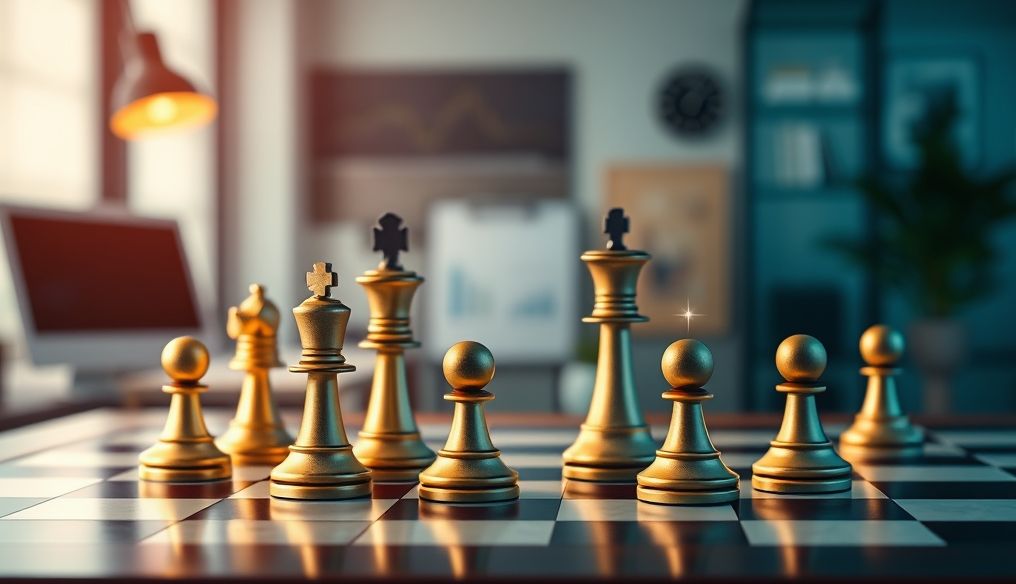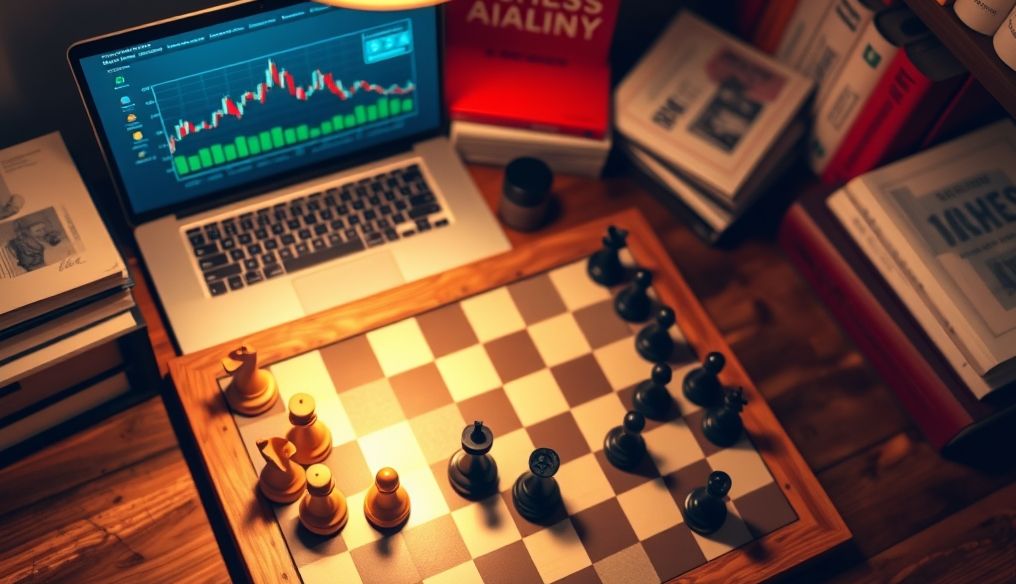How Does Chess Benefit Strategic Thinking and Improve Your Life?
Chess, a game that combines art, science, and sport, is not merely a pastime but a powerful tool for developing mental abilities and enhancing strategic thinking. Throughout history, chess has played a significant role in developing planning, forecasting, and decision-making skills, making it beneficial in various aspects of life.
1. Chess: Training the Mind for Strategic Thinking
Strategic thinking is the ability to analyze the current situation, define goals, and develop a plan to achieve these goals while considering potential obstacles. Chess provides an ideal environment for developing this ability, as players must think about their future moves, analyze potential opponent moves, and plan to win.
1.1. Advance Planning
In chess, it's not enough to think only about the next move; you must think about a series of future moves. This requires advance planning and careful analysis of the situation on the board. For example, you might sacrifice a piece to gain a strategic advantage in the future.
1.2. Predicting Opponent Moves
A key part of chess is trying to predict the opponent's moves. This requires a deep understanding of potential opponent strategies, an ability to read body language (if playing face-to-face), and analysis of their playing style. This mental exercise enhances the ability to predict the behavior of others in real life.
1.3. Risk Assessment
Every move in chess carries potential risks. The player must carefully assess these risks before making any decision. This teaches the player how to balance potential gains and losses, a vital skill in strategic decision-making.
2. Benefits of Chess in Improving Memory and Focus
In addition to strategic thinking, chess plays an important role in improving memory and focus. Chess requires remembering past moves, analyzing patterns, and focusing on small details. These skills are essential for success in many other areas.
2.1. Enhancing Working Memory
Working memory is the ability to retain information in the mind and use it to process new information. Chess enhances working memory by requiring the player to remember the positions of pieces, analyze potential moves, and plan for the future.
2.2. Improving Focus
Chess requires intense focus to avoid costly mistakes. This mental exercise enhances the ability to concentrate for long periods, helping to improve performance in other tasks that require focus.
2.3. Increasing Attention to Detail
In chess, small details can have a significant impact on the final result. This teaches the player the importance of paying attention to detail, a valuable skill in many fields, such as science, engineering, and medicine.
3. Chess and Developing Problem-Solving Skills
Chess is essentially a series of problems that must be solved. The player must analyze the current situation, identify the problem, and develop a plan to solve it. This mental exercise enhances problem-solving skills, an essential skill for success in life.
3.1. Critical Analysis
Chess requires critical analysis of the situation on the board. The player must assess the strengths and weaknesses of their position and the opponent's position, identify potential threats, and look for available opportunities. This enhances the ability to think critically, a vital skill in making difficult decisions.
3.2. Creativity and Innovation
Sometimes, solving a problem in chess requires creative thinking and innovation. The player may need to think outside the box and find unconventional solutions to complex problems. This enhances the ability to be creative and innovative, valuable skills in fields such as art, design, and technology.
3.3. Adaptability
The situation in chess is constantly changing. The player must be able to adapt to these changes and adjust their plans as needed. This enhances adaptability, an essential skill for success in a changing environment.
4. Chess as a Tool for Improving Decision-Making
Decision-making is an essential part of chess. The player must make quick and accurate decisions under pressure. This mental exercise enhances decision-making skills, helping to improve performance in real life.
4.1. Evaluating Options
Before making any decision in chess, the player must evaluate all available options. They must weigh the potential gains and losses of each option and choose the option that achieves the best results. This enhances the ability to evaluate options, a vital skill in making important decisions.
4.2. Making Decisions Under Pressure
Chess players often have to make quick and accurate decisions under pressure. This teaches the player how to handle pressure and make logical and rational decisions even in difficult circumstances.
4.3. Taking Responsibility
In chess, the player bears full responsibility for their decisions. If they make a wrong decision, they will suffer the consequences. This teaches the player the importance of taking responsibility for their actions, an essential skill for success in life.
5. Chess and Personal Development
In addition to mental benefits, chess can contribute to personal development. Chess can teach players patience, perseverance, and self-discipline. These qualities are essential for success in any area of life.
5.1. Patience and Perseverance
Chess requires patience and perseverance. It may take hours to solve a complex problem, and the player may lose several times before winning. This teaches the player the importance of not giving up and continuing to try until the goal is achieved.
5.2. Self-Discipline
Chess requires self-discipline. The player must stick to their plan, avoid temptations, and focus on the ultimate goal. This teaches the player the importance of self-discipline, a quality essential for success in any area of life.
5.3. Respect for the Opponent
Although chess is a competitive game, it requires respect for the opponent. The player must respect the opponent's skills, learn from their mistakes, and congratulate them on winning. This teaches the player the importance of mutual respect, a fundamental value in human relationships.
6. Chess in Education
Many schools and universities around the world have recognized the value of chess as an educational tool. Chess is used to teach students strategic thinking, problem-solving, and decision-making skills. Studies have shown that chess can improve students' academic performance.
6.1. Improving Academic Performance
Numerous studies have shown that chess can improve students' academic performance. Chess can improve reading, writing, and math skills, as well as critical thinking and problem-solving skills.
6.2. Fostering Creativity
Chess can foster creativity by requiring students to think outside the box and find unconventional solutions to complex problems.
6.3. Developing Social Skills
Chess can develop social skills by teaching students how to communicate with others, work as a team, and respect the opponent.
7. Chess and Technology
Technological advancements have made chess more accessible than ever before. Chess can now be played online with players from around the world, or against powerful computer programs. This provides new opportunities to learn chess and improve skills.
7.1. Playing Chess Online
Chess can be played online with players from around the world. This provides new opportunities to practice chess and improve skills, as well as meet new people from different cultures.
7.2. Chess Computer Programs
Powerful chess computer programs are available that can be used to analyze games, identify mistakes, and learn new strategies. These programs are a valuable tool for improving chess skills.
7.3. Chess Databases
Chess databases are available that contain millions of games played by top players in the world. These databases can be used to analyze games, study different strategies, and learn from the best players in the world.
8. Tips for Improving Your Chess Skills
If you want to improve your chess skills, here are some tips that can help you:
- Learn the basics of the game: Before you can play chess well, you need to understand the basics of the game, such as how the pieces move, the rules of promotion, and how to execute a checkmate.
- Solve chess puzzles: Solving chess puzzles is a great way to improve your strategic thinking and problem-solving skills.
- Play chess regularly: The best way to improve your chess skills is to play chess regularly.
- Analyze your games: After each game, take some time to analyze your mistakes and learn from them.
- Study the games of top players: Studying the games of top players can help you learn new strategies and improve your skills.
- Use chess computer programs: Chess computer programs can help you analyze your games, identify mistakes, and learn new strategies.
- Be patient and persistent: It may take a long time to improve your chess skills, so be patient and persistent.
Conclusion
Chess is not just a game; it's a powerful tool for developing mental abilities and enhancing strategic thinking. Chess can help improve memory, focus, problem-solving, and decision-making. In addition, chess can contribute to personal development by teaching players patience, perseverance, and self-discipline. Whether you're a beginner or an experienced player, chess can provide you with numerous benefits in various aspects of your life.




